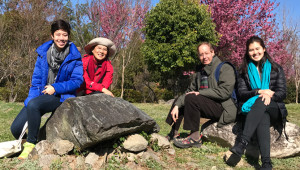Thirty days before Trump took his oath as the 45th President of the United States, I left New York and landed at the Pudong International Airport in Shanghai, China. This was my first time back after almost 5 years since leaving for college in the United States. I was anxious about what this homecoming would uncover. I thought:
“Will I feel like an outsider to a place I once called ‘home?’”
“Will relatives judge me because my Mandarin is rusty?”
“Will my mother, who was born and raised in Shanghai, feel her daughter is now ‘American?’”
Growing up with an American father and Chinese mother, our family straddled social, political, and economic values of East and West. As a young girl, I was hyper-aware of the need to embody the two sides of my identity equally – as if I wanted to be split perfectly in half. Even as I grew older, I disengaged from holding strong political views behind the rationale (or excuse) of being a “third-culture-kid” without a strong sense of bi-cultural identity. This took a one-hundred-eighty-degree turn during the 2016 Presidential Election.
Up until this point in time, my ability to be a chameleon in different environments served me well. It was my secret to adapting, sometimes disappearing, among unfamiliar places and people. I remained tethered to both my Chinese and American roots, but unable to completely identify with either. In my dance between two cultures, Trump’s nationalistic and racist rhetoric placed a magnifying glass over the questions like: “who are you?” and “where are you from?” I began to ask myself if I could ever belong in America if I was part Chinese.
Trump’s charged threats about the Chinese stealing American jobs or their role in the “hoax” of global warming pushed me to face the reality that I am in fact, Chinese. And if a half-Chinese girl did not belong here, then where could I call home?
When I touched down in Shanghai, the seven-thousand miles didn’t quell my anxieties. In fact, my immersion back into China heightened the jarring disconnect I felt towards Trump’s attitude towards outsiders.
As I rediscovered Shanghai, I felt optimism and hope. The more I witnessed the work ethic and integrity of the Shanghai-nese, the more frustrated I felt when reading articles via a VPN about Trump’s outlook on immigrants around the world; the more conversations I had with business owners and Chinese millennials, the more I wanted to shout: “the Chinese did not make up climate change!”
Over the course of the trip, the girl who was always so careful to mediate between two cultures felt like the bonds between East and West were being undermined by someone in a position of great power – someone who also does not care about Chinese history or culture. As many of my peers and friends from around the globe feel, I am scared that the leader of the “Free World” will continue to alienate, discriminate and target those who do not fit his vision to “Make America Great Again.”
A week after I returned to the U.S., Trump was sworn into office. As I attempted to settle back into my routine in New York, I missed the buzz of Shanghai’s subway, the lively markets, my mom, and my dad. I asked:
“Will I feel like an outsider in a city I have started to consider ‘home?’”
“Will friends judge me because I am not American enough?”
“Will my colleagues perceive me as Chinese?”
I recognized that when I am in America, I am considered Chinese; when I am in China, I am perceived as American. Mediating between two cultures all of my life has taught me how to balance, to listen, to empathize. Yet now, more fiercely proud of both parts of who I am, I chose to act. I denounce Trump’s xenophobic stance because it undermines the values I grew up in – I want to maximize the best in our humanity. I want to unify.




